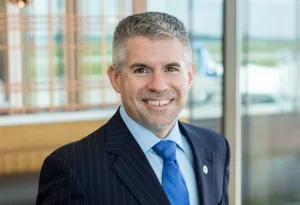
Home » Spokane bankers refocus on closer ties to customers
Spokane bankers refocus on closer ties to customers
After real estate heyday, building 'relationships' regains strong emphasis
November 12, 2009
Bankers here say they're more interested in relationships.
They aren't talking about their feelings, but the word "relationship" does have special meaning to them, especially during a financial sector crisis that has sent them scrambling to get back to basics.
In banking, a relationship is the link an institution has with a customer who has deposits in the bank, loans from the bank, or other long-term arrangements.
One banker here says flatly that his institution now will make loans only to those with whom it has a relationship.
"It used to be that if a guy who is a good credit risk wanted to borrow money to build an apartment building, we would make the loan, even if he didn't bank with us," the banker, Randall L. Fewel, president and CEO of Inland Northwest Bank, of Spokane, says. "Today, we wouldn't. If they don't have money in the bank, if they don't have a relationship with us, we won't make the loan."
Peter Stanton, chairman and CEO of Spokane-based Washington Trust Bank, says that in the commercial banking business, there's a big difference between a "relationship" and a "transaction."
Banks do lots of different kinds of business with relationship customers, including holding their deposits, handling their operating accounts, and providing other financial services on an ongoing basis, while a transaction is more transitory, Stanton explains.
"In the heat of the real estate boom, banks would make a transaction loan to a developer who wanted to finance a project," Stanton says. He says the developer would get a loan from an insurance company as the project was being wrapped up and repay the bank loan.
"The loans were short term, had good pricing, and didn't have to be on the books very long," he says. "Developers would shop for the best deal and go with the best price.
"In my mind, that's the definition of a transaction," Stanton says. "That isn't anything we've ever done much of." He adds, "We've always been a relationship bank, for a very long time. All commercial banks would like to look at themselves that way."
Some developers have long-term relationships with banks, but even in such a case, a developer might have projects all over a region—and not have all of its business with one bank, Stanton says.
Legal lending limits keep banks from having more than a certain amount of business with any one customer, which can keep a bank from handling all of a busy developer's loans, and banks generally are reluctant to lend money on projects that are being done very far away, which also can limit the amount of business a bank has with a developer.
Now, with real estate markets having plunged, banks are reporting deep losses from real estate and development loans and are moving away from them.
Also, regulators are enforcing stricter capital requirements, which restricts banks' capacity to lend, and as banks ration their lendable capital, they're making sure they take care of their best customers, such as the businesses that have accounts with them, Stanton says.
"There's a return to banking fundamentals when you talk about relationships," and in times like these, people like to hear talk about a return to fundamentals, he says.
On Oct. 22, when Sterling Financial Corp. posted a third-quarter net loss of $463.7 million, Greg Seibly, its new acting president and CEO, said, "The leadership team is committed to building upon the strength of Sterling's relationship-focused franchise."
In addition to growing deposits, lowering funding costs, and maintaining good liquidity, Sterling had "deepened customer relationships," Seibly said.
He said Sterling had "made significant progress reaching new customers, while ramping up our service to existing customers."
The next day, while talking with stock analysts in a conference call, Seibly said one of five priorities the company's board had outlined was "to refocus our business on relationships and away from transactions." Executives also spoke of a "return to relationship banking."
Fewel says that banking through building relationships "was one of those fundamentals that I learned in my early years. In the 2000s, many of us strayed away from that." He says he hopes that never happens again.
Latest News
Related Articles

_web.webp?t=1769673727)
_web.webp?t=1769673728)
_web.webp?t=1769673735)
